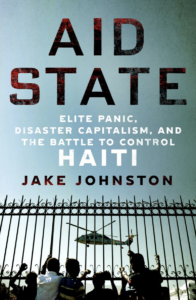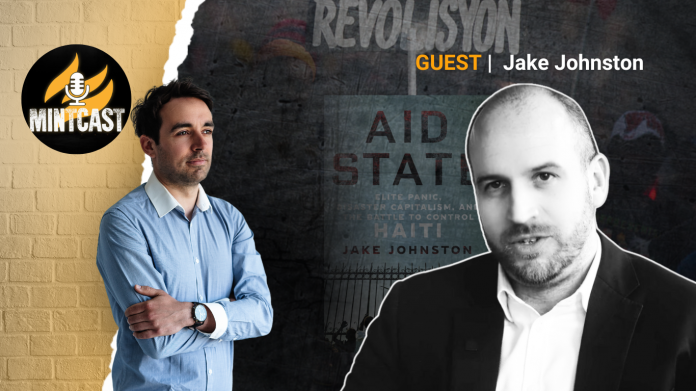Haiti is in crisis. As armed groups come together and storm the island nation’s institutions, leading to mass prison breaks, U.S.-backed Prime Minister Ariel Henry – who was abroad at the time, desperately trying to negotiate some kind of foreign intervention – has resigned.
Henry’s departure has left a power vacuum on the island. Will an alliance of armed groups seize power in a revolution? Will factions of the old government hang on? Or will the United States intervene to reassert control over the Caribbean nation?
On today’s MintCast, Jake Johnston joins Alan MacLeod to discuss the turbulent situation in Haiti. Johnston is Senior Research Associate at the Center for Economic and Policy Research (CEPR) in Washington, D.C. He is the lead author for CEPR’s Haiti: Relief and Reconstruction Watch blog and author of the book, “Aid State: Elite Panic, Disaster Capitalism, and the Battle to Control Haiti.”
Henry, Johnston said, has faced a “legitimacy crisis from day one.” Firstly, he was named prime minister in July 2021, just two days before the assassination of dictatorial president Jovenel Moïse. Secondly, many Haitians have never accepted the way he came to rule, either. As Johnston explained:
What brought Henry to power was basically a tweet; a press release from the Core Group, this group of international diplomats that has functioned as a de facto fourth branch of government since the 2004 coup against [President Jean-Bertrand] Aristide, that urged Henry to form a government. And lo and behold, he became prime minister and formed a government the next day.”
 Many in the West are now openly calling for another U.S.-led intervention on the Caribbean island nation. “This time, Haiti really is on the brink. The US and UN must act to restore order,” wrote the influential think tank Chatham House. Meanwhile, The Washington Post called for a more “robust” and “broader” intervention than the one the UN has suggested, which could see American boots on the ground for the third time in 30 years.
Many in the West are now openly calling for another U.S.-led intervention on the Caribbean island nation. “This time, Haiti really is on the brink. The US and UN must act to restore order,” wrote the influential think tank Chatham House. Meanwhile, The Washington Post called for a more “robust” and “broader” intervention than the one the UN has suggested, which could see American boots on the ground for the third time in 30 years.
Johnston was dead against the idea, instead suggesting that we:
Let Haitians determine their own future, for a change. This is something we haven’t allowed to happen through our interventions for a long time. But also, we have to be having a real conversation about reparations, about this debt, the debt that the world owes to Haiti.”
But far from paying debts to Haitians, the current government in Washington D.C. is concentrating on stopping Haitian immigration and is reportedly even considering using its notorious detention center at Guantánamo Bay, Cuba, to lock up Haitian migrants and refugees.
The United States has an extremely long history of torturing Haiti. From refusing to recognize its independence for decades to invading and occupying it for two decades in the early twentieth century to supporting dictators and organizing coups on the island, Haiti’s current predicament is, in no small part, down to Washington.
Today, MacLeod and Johnston discuss the history, present and future of American imperialism in Haiti and what Haiti’s short-term future looks like.
MintPress News is a fiercely independent media company. You can support us by becoming a member on Patreon, bookmarking and whitelisting us, and subscribing to our social media channels, including YouTube, Twitter and Instagram.
Subscribe to MintCast on Spotify, Apple Podcasts, and SoundCloud.
Also, check out rapper Lowkey’s video interview/podcast series, The Watchdog.
Alan MacLeod is Senior Staff Writer for MintPress News. After completing his PhD in 2017 he published two books: Bad News From Venezuela: Twenty Years of Fake News and Misreporting and Propaganda in the Information Age: Still Manufacturing Consent, as well as a number of academic articles. He has also contributed to FAIR.org, The Guardian, Salon, The Grayzone, Jacobin Magazine, and Common Dreams.
The post Will the US Intervene in Haiti? With Jake Johnston appeared first on MintPress News.
